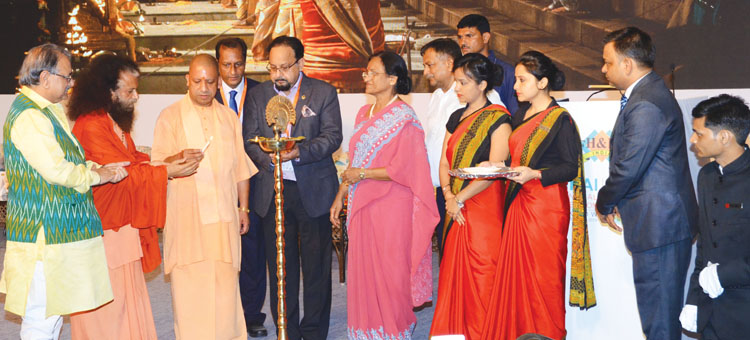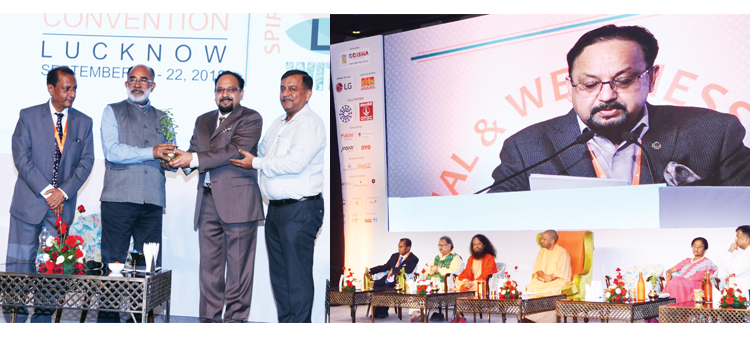Mumbai: Federation of Hotels & Restaurants Association of India (FHRAI), the apex body of the Indian hospitality industry representing hotels, restaurants and associates, held their 53rd Annual Convention in Lucknow recently. Yogi Adityanath, Chief Minister of Uttar Pradesh, inaugurated the annual convention attended by more than 1200 delegates, the largest in the history of FHRAI.
Delegates across the country network with top policy makers, captains of the industry, top-notch entrepreneurs, global subject matter experts and representatives from society
Speaking on the occasion, Adityanath said, “Uttar Pradesh (UP) provides immense opportunities for Spiritual & Wellness Tourism. The Government of UP is seeking investments of Rs. 5000 crore every year from the tourism industry. Through the collective efforts and awareness generated by conventions such as FHRAI, the Government has already received proposals worth Rs. 2500 crore from the hospitality sector.”
The theme of the Convention was Spiritual & Wellness Tourism. This is the second time the convention is coming to the State, Agra having hosted the same in 2010.
Garish Oberoi, President, FHRAI said, “The State of Uttar Pradesh is rich with tourism experiences, especially for the spiritually and religiously inclined.” Oberoi also urged the Government of India to grant FHRAI’s long-standing demand for infrastructure status for projects worth Rs. 25 crore and above, as well as for creating the right infrastructure to aid the increase in footfalls of high-spending tourists.
The Annual Convention offered an excellent opportunity for delegates from across the country to network with top policy makers, captains of the industry, top-notch entrepreneurs, global subject matter experts and distinguished representatives from civil society.
Addressing the delegates on day 2, K J Alphons, Union Minister of State for Tourism (I/C) said that about 60 per cent of India’s domestic tourism is spiritual in nature. “We have so much to offer in the area of Spiritual Tourism. Ayurveda, Yoga, Unani, Siddha and Homoeopathy provide multiple avenues for Wellness Tourism.”
The Ministry of Tourism (MoT) has sanctioned Rs. 5952 crore for 74 projects under Swadesh Darshan of which 30 will be completed by December 2018. Under PRASAD, for which Rs. 727 crore has been sanctioned, 24 projects are nearing completion. Ten Iconic Sites will see mega infrastructure development to create world-class facilities and big money has been earmarked towards this.
According to the Minister, 144 million Chinese travelled out last year of which India welcomed a paltry 240,000. MoT undertook a four-city roadshow in China this year. In 2017, Dubai conducted 40 promotions in China. “This is the kind of aggressive promotion our neighbors are doing and they have grown the Chinese traffic ten times,” Alphons said. MoT has appointed a strategic advisor in China to tap this huge market.
Surinder Kumar Jaiswal, Chairman – Convention Organizing Committee and Honorary Secretary, FHRAI said, “Through the Convention FHRAI is also promoting Uttar Pradesh as well as the iconic Kumbh Mela, which is taking place at Allahabad from January to March 2019. We will also be highlighting ‘one district, one product’, the flagship initiative of the Government of UP.”
The Annual Convention also saw a Hospitality and Supply Chain Exhibition featuring the latest products and technologies, offering delegates an opportunity to stay abreast of state-of-the-art technologies and new products and services relevant to the sector.
The valedictory function was graced by Dr. Dinesh Sharma, Deputy Chief Minister of UP. He said, “The Government has been working on improving connectivity – both infrastructure and digital, across the State to attract investments in travel and hospitality segments.” Speaking about the development of tourism circuits – Ramayan Circuit, Buddhist Circuit, Krishna Circuit and Sufi Circuit, that have diversified the scope of Spiritual Tourism in the State, he added, “We want to set such an example in our State that our hotels and tourism businesses become the foremost signs of development in UP.”
Dr. Sharma conferred the FHRAI Hospitality Awards to achievers from the tourism and hospitality industries. Broadly put under three categories as Best Entrepreneur, Manager and Institute of the Year, the awards are classified as Best Entrepreneur Awards (Best Young Hotelier; Best Young Restaurant Entrepreneur); Best Manager Awards – Best Hotel General Manager; Best Luxury Hotel General Manager (Upper Upscale, Midscale); Hotel F&B / Banquet Manager; Best Chef; Best Hotel Front Office Manager/Rooms Division Manager; Best Hotel House Keeper; Best Hotel Sales & Marketing Manager; Best Hotel Revenue Manager; Best Restaurant Manager (Hotel Restaurant/Standalone Restaurant); Best Hotel HR Manager; Best Security Manager and Best Hospitality Journalist; and Best Institution Awards – Best Hospitality Institute; Best Hotel Spa; Best Wellness Resort; Best Green Hotel (Luxury – Upper Upscale/Upscale/Midmarket); and Best Green Restaurant.
Agra is a slum: K J Alphons
Voicing his disappointment Union Minister K J Alphons called Agra a slum while addressing the delegates at the FHRAI Annual Convention. He added that while the roads were chaotic and filled with rubbish, the famed city of the Taj Mahal has no drainage system. He urged the State government not to blame the Supreme Court and remove encroachments immediately. The Minister dared the State government to demolish the Circuit House and build a shopping mall where locally manufactured leather, textiles and handicrafts can be retailed. He said the 10-acre land parcel can also be used for developing a 5-star hotel, mega convention centre and multiplex. “These will be very useful for the ever-increasing tourist footfalls into Agra,” he stated.
Cleanliness top priority in Agra: Awanish Kumar Awasthi IAS
Interacting with media persons on the sidelines of the convention, Awanish Kumar Awasthi IAS, Additional Chief Secretary, Government of UP said that 60 projects have been registered under the Tourism Policy of UP which hinges on health, wellness and adventure tourism. New projects have been sanctioned Rs. 70 crore and the Government will allot land on favourable terms to investors.
“The draft plan for Agra has been published and the Government is soliciting feedback now. Cleanliness is one of the major initiatives the Government is driving in Agra. As it is one of the Iconic Sites, Agra will undergo major transformation. Four stakeholder meetings have already been held. The Ministry of Environment has to approve the setting up of new ‘green’ hotels in Agra.”
Knowledge sharing
The panel discussion on Spiritual and Wellness Tourism had some valuable insights. Nimai Lila Das of Govardhan Eco-villlage said “Tourism is evolving into ‘travel with purpose’. Health and wellness can align well with this evolution because beyond physical gratification, mental and spiritual well-being are equally important. Author and Lifestyle Coach Shubha Vilas felt hotels should go beyond television, music and reading, and offer entertainment for the mind which is content aimed at enlightenment.
Vibhas Prasad of Leisure Hotels informed that people who visit their resort by the Ganges in Rishikesh, partake in the evening ‘aarthi’ but also do white water rafting in the morning. “The profile of the spiritual tourist has drastically changed,” he said. “They are not ascetics. They enjoy the good things in life yet have spiritual obligations to fulfill.”
The session titled Farm to Fork: The New Food Culture had very interesting conversations around food sustainability and bio-diversity. The panelists agreed that chefs need to pay more attention to farmers and restaurants have to consider fresh local produce though integrating local ingredients can be done progressively. They also opined that it makes economic sense as buying local produce is cheaper and offers a source of livelihood to farmers citing the Millet Biriyani at Andaz New Delhi’s AnnaMaya restaurant as a good example.
“Why fly in quinoa when we have millets?” asked Executive Chef Alex Moser of Andaz, one of the panelists. “Earlier menu writing was a mechanical process – change the menu every quarter. We revisited the way we look and write menus. Based on season of produce, we incorporated them into our menus and ensured great story telling which I think is equally important.”
Millennial consumers are already very supportive of ‘Farm to Fork’ as they are health and safe-food conscious. Chef Shipra Khanna urged hoteliers and restaurateurs to think about food sustainability which uses practices keeping environment and animals in mind. Achintya Anand of Krishi Cress said ‘Farm to Fork’ has to be more than lunch or dinner; it has to be a philosophy. Chefs have to be more involved in the procuring process according to him. “Chefs and farmers can help maintain bio-diversity of the region”, said Sneh Yadav of Tijara Organic Farm. “Chefs should be willing to handhold farmers and also to work with seasonal and regional produce.”
In the session on Industry Performance & Outlook, panelists unanimously agreed that while hotel occupancies have started to climb, rates have not. The average room rate across the country is below $100 and that is a shame. Neeraj Govil of Marriott said that their resorts command good rates though the business/city hotels feel the squeeze. While big hotels offer benefits of scale, only nine hotels in India have 500 plus rooms. “Should we be talking size?” he asks.
“Big hotels can do well only in metros. Our big hotels have GOP touching 50 per cent but initial investment and risk are high. Yes we need more large hotels. China has 25 large hotels.” Arun Saraf of Juniper Hotels felt through over competition, the industry has destroyed itself. “We need discipline and discretion when it comes to pricing,” he said.
Param Kannampilly of Concept Hospitality blamed OTAs for creating a false perception of cheap rooms to acquire more consumers. “GST made us cap prices at Rs. 7500. Mid-year GST revised the tax slabs but what can we do now as we have already offered the rates for contracts?”
The panel also felt that it is better to add more rooms to an existing property if FSI permits, rather than building new ones. They agreed that ‘combo hotels’ (more than one hotel brand in one building or separate units within a campus) are doing well.
Kannampilly was of the view that hoteliers should engage restaurant operators and not try to do everything by themselves. Saraf said that the era of five restaurants for a 200-room hotel is passé. “I’d rather do 400 rooms and 2 restaurants. With standalone restaurants doing very well, guests tend to step out for lunch and dinner. So instead of investing in a restaurant, might as well put up few more rooms.”
Govil informed that 23 per cent of Marriott’s India revenue is from restaurants, making its success critical for achieving overall numbers. Marriott leases out F&B space to external operators. He rued that breakfast, the most important meal of the day, which a resident guest is most likely to have at the hotel, has been given away for free as part of the room plan. “What could earn anything between Rs. 600 and 1000, has now become a cost for all of us.”
At the session titled ‘Is Developing a Wellness centre/resort a good business decision?’ Himmat Anand of Tree of Life Hotels & Resorts opined “There is more value in keeping people healthy. The wellness industry is growing 6 per cent YoY when global tourism is only managing 3 per cent. Frankly wellness is bigger than the pharma industry today.”
At the session ‘Effective Asset Management and Maximizing Value’, panelists felt both asset manager and operator are here to stay as they play by their strengths. Saurabh Gupta of Hotelivate Consulting said “They can be avoided if the owner is hands-on. Most importantly, hotels should do outlet specific P&L.”
Garish Oberoi, President, FHRAI said while introducing FHRAI Hospitality Awards, “These awards have been instituted by our association to encourage young industry professionals and recognize excellence in the hospitality industry. They have established themselves as being among the most credible and coveted accolades in the industry.”
The largest convention in the history of FHRAI witnessed over 65 speakers across the various sessions from 20-22 September 2018 held at Ramada Hotel & Convention Center, Lucknow.






